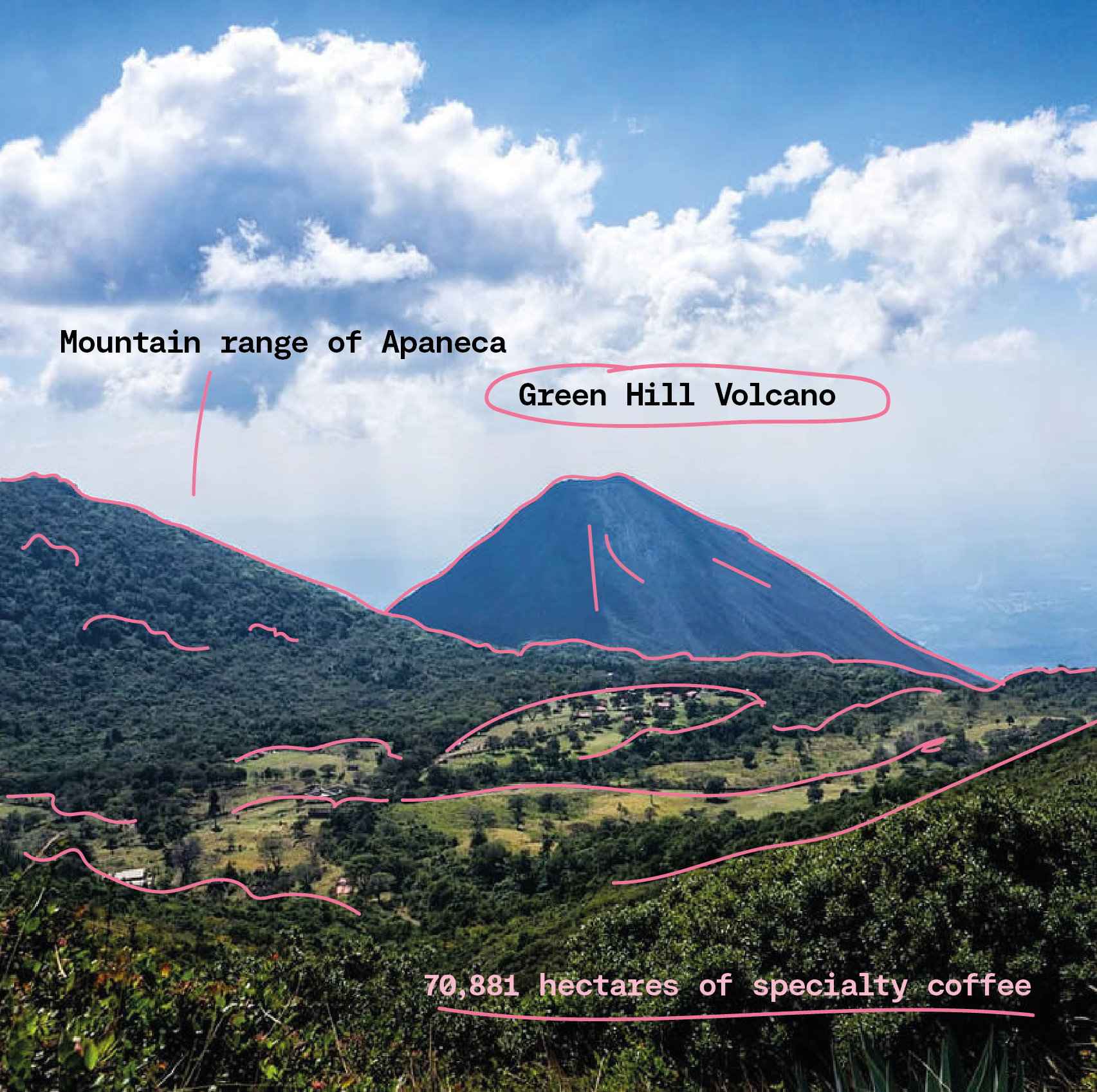Key Descriptor: Kiwi
Aroma/Flavor: Toasted cane sugar, dark chocolate, kiwi, yellow peach, toast and pineapple
Varietal: Bourbon
Crop altitude: 1,550 m.a.s.l.
Screening: 17/19
Flavor: 8.25
Acidity: 8.25
Finish: 8.00
Body: 8.25
Balance:8.25
Overall:8.25
Cleanliness in cup: 10.00
Sweetness: 10.00
Uniformity: 10.00
TOTAL: 87.50 SCA
WHAT ARE SCA POINTS?

Process: State-of-the-art
Process type:Natural anaerobic
Fermentation: Aerobic
Drying technique: Sleeping bag

ORIGIN: El Salvador
REGION: Apaneca-Ilamatepec
PRODUCER: Andres Salaverria
The Apaneca is a volcanic mountain range located in western El Salvador, including the Ilamatepec volcano, one of the most active in the region. The Apaneca-Ilamatepec coffee region has an estimated population of 1.26 million inhabitants and its area is 4,289.95 km², this region has 37 coffee districts, including Santa Ana, Ahuachapán, Juayúa, and Sonsonate, home to more than 9,740 families that cultivate more than 70,881 hectares of Arabica coffee of the Pacas, Bourbon, Pacamara, Catimores, Casticis, Cuscatleco and Catuaí varietals.
THE PRODUCER
Andrés Salaverría has been passionate about coffee growing since he was a child. His family has been involved in it for over 100 years, with farms in the coffee-growing regions of Atiquizaya, Concepción de Ataco, Jayúa and Apaneca. Andrés remembers how he enjoyed spending every night with his father at the El Molino mill to see how the coffee cherries arrived. Since then, his interest has grown. Every summer he worked temporary jobs at the family coffee business with the aim of learning and implementing new knowledge. After finishing university, he completed the Ernesto Illy Master’s degree in coffee science and economics. In 2011, Andrés returned to El Salvador and, together with his father, Don José Antonio Salaverría, they have formed a great team. Among the farms that the Salaverría family manages is the San Francisco farm, located near the town of La Majada, in the coffee-growing region of Apaneca – Ilamatepec, in the Juayúa district. This farm is home not only to a coffee-producing region, but also to a natural forest reserve that was donated to the National Forestry Association of El Salvador for the purpose of preserving a beautiful habitat for many exotic species of plants and animals. Its rich volcanic soils make San Francisco an ideal location for coffee cultivation, which is done entirely in the shade, with harvesting activities through selective manual collection of fully ripe cherries.

Preguntas frecuentes sobre este café
¿Qué método de preparación es ideal?
Para apreciar al máximo los aromas y matices de Malakabra, recomendamos el método de vertido manual (“pour-over”) con filtro de papel (por ejemplo, V60 o Chemex). Usa agua entre 92 °C y 96 °C, y una proporción de 1 g de café por cada 15 ml de agua. De esta forma obtendrás una taza limpia, equilibrada y muy aromática.
¿Cuántas tazas salen por paquete?
Cada paquete estándar de 250 g de Malakabra produce aproximadamente:
16–17 tazas.
30 tazas.
¿Cuánto dura el café una vez abierto?
Una vez abierto, recomendamos conservar el café en un envase hermético, en un lugar fresco y alejado de la luz directa. Para disfrutarlo en su punto óptimo de frescura:
- Consumir en las primeras 2–3 semanas tras la apertura.
- Hasta 2 meses si se mantiene bien sellado.
¿Se puede usar con cafetera italiana?
¡Sí! Malakabra funciona muy bien en moka (cafetera italiana). Ajusta la molienda a un tamaño medio-fino (más grueso que para espresso, pero más fino que para filtro) y llena el depósito sin prensar excesivamente. Calienta a fuego medio-bajo y retira justo cuando empiece a burbujear para evitar sabores amargos.
Testimonios de usuarios
Tu café Malakabra en 4 pasos














